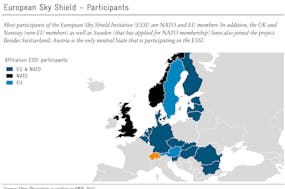In its May 9, 2015 edition, The Economist fired something of a broadside against the economic model that has dominated Germany and Switzerland since the Second World War. So called Ordoliberalism continues to play a big role in both countries – and has moulded the economic thinking of this author.
Better known publicly as “the social market economy”, Ordoliberalism, which has always had an interdisciplinary basis, is most closely associated with leading lights like Walter Eucken, Friedrich August von Hayek and Ludwig Erhard, the former German Economics Minister and Chancellor, who is widely credited as father of “Wirtschaftswunder”.
It’s almost grotesque to demand greater pragmatism from Germany
Ordoliberalism stands out for some clear fundamental principles. Among them: the need for state regulated competition policy (because companies like to form cartels); directing monetary policy towards the sole goal of price stability; and the principle of Haftung – liability and responsibility – founded on stable and predictable economic policies. All these elements ask for a strong state – to be distinguished from an oversized or overbearing one. This packet of principles has served Germany and Switzerland well.
So it’s almost grotesque for economists, politicians and, as the example shows, journalists from much less successful countries to demand greater pragmatism from Germany. “Once in a while it is better to break rules than all go under in law-abiding misery. Yet that is not how things are seen in Berlin or Frankfurt”, concludes The Economist rather smugly. Today, that translates into a fairly clear call for looser monetary policy from the European Central Bank and economic stimulus through deficit spending and higher debt. Moreover, the “debt brake” – an instrument that has proved itself over years in Switzerland and that is now being introduced in Germany in somewhat less rigid form, is similarly viewed as the expression of misplaced austerity.
Amid all this faith in the state, perhaps it’s appropriate to remember the economic crisis didn’t come about because of excessive adherence to liberal principles – but just the opposite. The core concept of liability was undermined, whether, in the US property market, for social reasons or, in the global financial sector, under the guise of “too big to fail.” In the US, the authorities pursued monetary policies designed to prevent economic downcycles, including the equity markets, and conjured up deflationary dangers. Similarly here in Switzerland, the virtually overnight abolition of bank secrecy for foreigners, acceptance of the Minder Initiative (on shareholders’ rights, ed), or the referendum restricting immigration, have created immense uncertainty and contravened the idea of predictable economic policies guided by a “steady hand.”
People talk about competition, but the state keeps on growing
Soap box orators drone on about boosting competition, but that’s less popular in everyday politics. Just take two recent Swiss examples: the calls, after barely a few years in operation, to abolish the Cassis de Dijon principle (a Swiss law designed to boost competition and lower prices by removing protectionist labelling barriers against processed foods from the European Union, ed). Or look at recent attempts to defame, or even ban, Uber, the internet taxi service that could finally inject more competition into a decrepit business. Meanwhile, public sector social services are growing, taking us ever further from the streamlined state. Indeed, the fiscal quota in Switzerland is heading for 50 per cent.
Ludwig Erhard once declared indignantly: Pragmatism is actually a euphemism for opportunism. And he wasn’t wrong. Of course, new insights have to be taken into account. And of course, one has to remain open to new ways of reaching the same goal. But, it’s equally certain that sticking to one’s principles helps to avoid getting distracted by every new fad. And it helps, when governments are changing all the time, to avoid constant shifts of direction. Finally, it offers governments and citizens a point of reference. So we urgently need greater faith in principles – pragmatism is mainly just an excuse for flabby thinking.
This article appeared (in German) in the Aargauer Zeitung of 15 May 2015.





